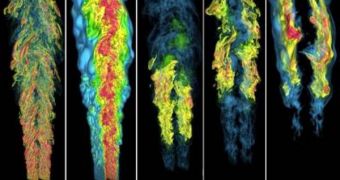The US Department of Energy (DOE) Office of Science has engaged in one of the largest scientific research initiatives of the last years, as it has begun to fund the construction of over 46 Energy Frontier Research Centers, to be errected all around America. One such institute will be built at Princeton University, which has already received some $20 million in funding for this endeavor. Overall, the DOE will spend about $777 million with these Centers, and most of the money come from the recently approved stimulus package.
Each of the Centers will be focused on studying combustion science, as in ways of making synthetic and artificial fuels burn more effectively, and with less emissions. The ultimate goal of the initiative is to aid the development of new classes of fuels, to replace oil, coal and natural gas, but in a sustainable way. That is to say, among other things, the Centers will also have to devise new ways of building engines that are able to maximize the innovations they create through their research.
“We applaud the vision and boldness of the Obama administration in instituting this substantial and comprehensive investment in energy science. We are excited to be part of the team to tackle the immensely challenging problems of energy sustainability and global warming,” Chung Law, who is the Robert H. Goddard Professor of Mechanical and Aerospace Engineering at the university, said upon hearing the DOE decision of funding the PU. He has also been designated to be the Director of the new Energy Frontier Research Center (EFRC).
“As global energy demand grows over this century, there is an urgent need to reduce our dependence on fossil fuels and imported oil and curtail greenhouse gas emissions. Meeting this challenge will require significant scientific advances. These centers will mobilize the enormous talents and skills of our nation's scientific work force in pursuit of the breakthroughs that are essential to make alternative and renewable energy truly viable as large-scale replacements for fossil fuels,” Steven Chu, the U.S. secretary of energy, added.
The official announced the awards on Monday, April 27th, at the annual meeting of the National Academy of Sciences in Washington, DC. Also present at the meeting, President Barack Obama delivered a speech on the issue as well. According to Chu, experts in quantum chemistry, chemical kinetics, combustion theory, modeling and diagnostics will all be involved in the Princeton EFRC, in hopes of accelerating the research efforts and making innovation come to pass sooner rather than later.
The Arthur W. Marks '19 Professor of Mechanical and Aerospace Engineering and Applied and Computational Mathematics Emily Carter, who will also be part of the Princeton team involved with the project, shared that the task ahead was very complex. Despite recent progress in a number of research fields related to cleaner or alternative fuels, it's highly unlikely that the internal combustion engine will be replaced very soon. “It's hard to imagine a plug-in airplane. It's imperative we research ways to burn carbon-neutral fuels efficiently and cleanly, which is easier said than done,” Carter concluded.

 14 DAY TRIAL //
14 DAY TRIAL //